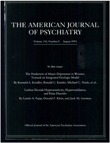Absence of linkage between chromosome 11p15 markers and manic- depressive illness in a Belgian pedigree
Abstract
OBJECTIVE: The original finding of genetic linkage in an Old Order Amish pedigree has been contradicted by the results of several subsequent studies. Using the same genetic parameter values, diagnostic criteria, and 11p15 genetic markers as those used to study the initial Amish population, the authors performed a linkage study of a four- generation informative pedigree in Belgium. METHOD: Recombinant DNA technology was used to analyze three markers for the chromosome 11p15 location: the genes for tyrosine hydroxylase (TH) and insulin (INS) and the c-Harvey-ras oncogene (HRAS). Diagnoses of the relatives of a proband with bipolar affective disorder were determined with the Schedule for Affective Disorders and Schizophrenia--Lifetime Version and based on the Research Diagnostic Criteria. Relatives were considered affected if they had bipolar disorder, unipolar disorder, or cyclothymia; a diagnostic hierarchy was developed to include unipolar disorder and cyclothymia in the linkage analysis. RESULTS: Pairwise analyses of the disease locus and each of the three polymorphisms excluded the possibility of close linkage between manic-depressive illness and the three chromosome 11p15 markers. Multipoint linkage analysis combining the information from all three genes also excluded linkage. CONCLUSIONS: The conflict between the original results from the Amish study and the many negative reports on chromosome 11 linkage of manic-depression has been interpreted as indicating genetic heterogeneity, but heterogeneity has not been documented for the 11p15 locus. Conversely, the linkage approach has major drawbacks, so other genetic strategies should also be considered.
Access content
To read the fulltext, please use one of the options below to sign in or purchase access.- Personal login
- Institutional Login
- Sign in via OpenAthens
- Register for access
-
Please login/register if you wish to pair your device and check access availability.
Not a subscriber?
PsychiatryOnline subscription options offer access to the DSM-5 library, books, journals, CME, and patient resources. This all-in-one virtual library provides psychiatrists and mental health professionals with key resources for diagnosis, treatment, research, and professional development.
Need more help? PsychiatryOnline Customer Service may be reached by emailing [email protected] or by calling 800-368-5777 (in the U.S.) or 703-907-7322 (outside the U.S.).



